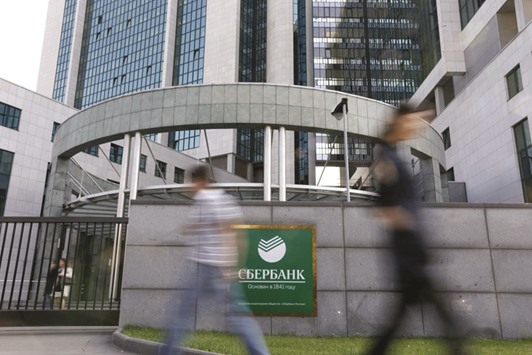After almost two years locked out of foreign capital markets, the former savings bank of the Soviet Union is marketing debt for the first time in its own backyard.
Sberbank PJSC counts almost every other Russian household as its client and hasn’t needed to sell local-currency bonds until now.
On Friday, the bank started accepting bids from investors for 10bn roubles ($148mn) of notes with a 10% coupon, according to a person familiar with the deal, who isn’t authorised to speak publicly and asked not to be identified.
Russia’s biggest bank is joining a dash to the local market as corporate borrowing costs fall to a 16-month low amid a surplus of rouble cash in the banking industry and a rebound in oil prices.
Besides a debt sale to its own pension fund last year, Sberbank hasn’t sold bonds since a €1bn- ($1.14bn) placement a month before the US and European Union shuttered their capital markets to Russia’s biggest companies as punishment for the Kremlin’s role in the Ukraine crisis.
“Sberbank has never seen much sense in issuing local bonds, they always preferred Eurobonds,” Ivan Guminov, a money manager at Ronin Trust in Moscow, said by e-mail. “Now, because of sanctions, they have to discover Russia.”
The debt can be redeemed after two years and the yield guidance compares with a rate of 9.44% for two-year government bonds.
A yield of about 10% “is a premium for sanctions, otherwise it would have been only five basis points” above the sovereign, Guminov said.
The government and Sberbank have the same rating of BBB-, the lowest investment grade, from Fitch Ratings.
The lender held 10.7tn roubles of retail deposits as of February, or 47% of the total nationwide, down from more than 50% in 2009, according to BCS Financial Group.
Sberbank’s press-service didn’t immediately respond to a request for comment. While deposits are a cheap source of cash for Sberbank, it still needs to diversify its funding mix, according to Yury Tulinov, the head of fixed-income research at Societe Generale’s Russian unit Rosbank PJSC.
“They may be taking advantage of the market situation,” Tulinov said. “The primary market is doing well and rates are attractive.”
The average yield on Russian corporate rouble debt fell seven basis points to 11.45% on March 31, the lowest since November 2014, UralSib Capital indexes show. Companies issued 97.1bn roubles of bonds in March, the most for the month since 2012 and the biggest month of borrowings since November, according to data compiled by Bloomberg. Banks are eager to invest their excess rouble cash in new bonds, while investor demand has also been stoked by an 11% gain since February for the price of crude, Russia’s main export earner.
The liquidity surplus is a result of government spending as the Finance Ministry taps its rainy-day wealth fund to plug the biggest budget deficit since 2010.
“In the local market, issuance in roubles will continue as there is plenty of liquidity available,” Riccardo Orcel, head of global banking at VTB Capital, said in an interview.
Lenders’ funds held with the central bank, including on correspondent accounts and deposits, have exceeded what they owe the monetary authority for almost a month and reached a peak of 430bn roubles on March 22, data compiled by Bloomberg show. That’s up from a deficit of 6.1tn roubles in December 2014.
It’s a good time for Sberbank to tap the local market, according to Fedor Bizikov, who manages about $1bn at GHP Group in Moscow.
“If they aren’t very greedy, they can sell it at slightly above 10%,” Bizikov said. “The market will gobble it up.”

Men walk past the headquarters of Sberbank in Moscow. Russia’s biggest bank is joining a dash to the local market as corporate borrowing costs fall to a 16-month low amid a surplus of rouble cash in the banking industry and a rebound in oil prices.
